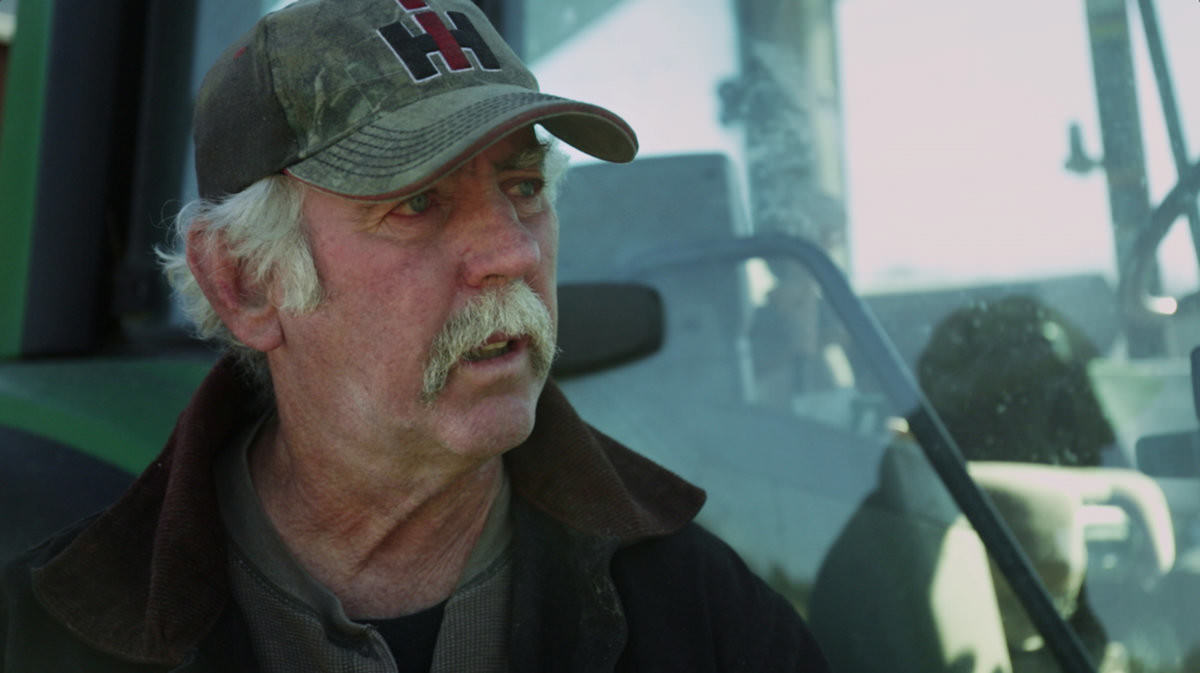Seeding Fear: The Story of a Farmer Who Took on Monsanto
Farmer Michael White tells about his legal battle with Monsanto in a short documentary, which was co-executive produced by singer-songwriter Neil Young.
Seeding Fear: The Story of a Farmer Who Took on Monsanto
Farmer Michael White tells about his legal battle with Monsanto in a short documentary, which was co-executive produced by singer-songwriter Neil Young.

In 2003, according to the film (which we’ve embedded below), White and his father Wayne, who was in his 80s at the time and has since passed away, were sued by Monsanto and accused of patent infringement after unknowingly cleaning genetically-modified Resistant Ready soybean seed for a local farmer. (Monsanto disputes this version of events.) In the documentary, the surviving White says he was put under constant surveillance by private investigators working for Monsanto, and claims he was threatened with death by one of the corporation’s salesman. White stopped cleaning seed for the public, as have many others, and he says the “thousand-year-old tradition of saving seed is over with” because Monsanto – whose patented genetically modified seed makes up 93 percent of all soy grown in the U.S. – dominates the market.
Jackson, 32, says he was shocked to learn of the “aggressive” tactics Monsanto used against farmers, including White, who are often put in a position where they have to settle out of court before having their cases heard by a jury.
“[Monsanto is a] very powerful company with a lot of money. It seems money talks,” says the filmmaker in a phone interview with Modern Farmer. “They are able to bury someone like Michael who doesn’t have the financial resources to keep fighting. A couple million dollars a year is nothing for them to keep the fight going and wear someone down until they are no longer able to fight. That’s what happened in Michael’s case. Although they did settle out of court, neither party has paid money to the other. It’s ultimately an assault on the foundations of farming.”
Jackson says many of the farmers sued by Monsanto end up with gag orders in their cases that prevent them from publicly speaking about what happened to them. White is only one of four farmers in North America who is free to speak about his case. Even so, White “is still really reserved in what he reveals because of the fear of retaliation,” Jackson says.

It was an accidental meeting that led to the documentary. According to Jackson, he was in Northern Alabama last year shooting an unrelated feature documentary about a famous high school basketball game and was looking for some filler shots (called “B roll” in film jargon). While filming old barns, a white truck came barrelling up. White stepped out and seemed very upset that Jackson was filming. After White informed the filmmaker that he’d been under surveillance by Monsanto for several years, the two men went back to White’s place and discussed the farmer’s story. The next time Jackson returned to the area he shot “Seeding Fear,” mostly while White worked around his farm.
Jackson says many of the farmers sued by Monsanto end up with gag orders in their cases that prevent them from publicly speaking about what happened to them. White is only one of four farmers in North America who is free to speak about his case.
“Given what he’s been through, he wasn’t very open when we first met. He’d lost his father during this process. It kind of broke his family apart. He got divorced. It was a very difficult time,” says Jackson. “Given all this he was willing to go there emotionally and show that vulnerable side. One of the most important parts of his story is that emotional aspect. The piece doesn’t talk about the health aspects of genetically modified organisms. That’s a part of the debate I’m not sure about. They haven’t been around that long so I think it’s hard to say – but what really interested me was the business practices that Monsanto takes on to push their seed into communities. I think Michael’s story was the perfect vehicle to address that issue.”
After shooting the film, Jackson edited the eight hours of footage he’d shot down to about 10 minutes then shelved the project until he heard about Neil Young’s newest record (his 36th), “The Monsanto Years,” a concept album criticizing Monsanto and its business practices. Jackson was able to get in touch with Young through Micah Nelson – the son of country musician and Farm Aid founder, Willie Nelson – who worked on the album with Young.
The filmmaker – who grew up in New Brunswick, Canada, and had been a longtime fan of Young, who is also from Canada – received a surprise call from the musician to discuss the project, which was produced by Kings Point Productions and released by Young’s company, Shakey Pictures.
“He’s a real activist and he wanted to get it out there as quickly as possible and get as many people to see it as possible,” says Jackson about Young. ” I really appreciated his enthusiasm so we finished as quickly as we could and then Neil released it. It traveled pretty fast.”
A representative for Monsanto told Rolling Stone in July that “Mr. White is not transparent in describing his actions or the situation. He actually admitted to knowingly planting, producing, saving, cleaning and selling Roundup Ready soybeans illegally.”
Jackson says White signed off on paperwork admitting to using the seed, but says that “when it comes down to settlement agreements, it’s not necessarily the truth of the situation but what the settlement terms ended up being and where Michael was financially.”
The filmmaker was glad Monsanto responded to the film because it shows “we struck a nerve” with the corporation and that “they were worried about how many people were going to see this film and how deeply it was resonating with people. They felt the need to lash back.”
You can watch the film in its entirety below.
Follow us
This work is licensed under a Creative Commons Attribution-NoDerivatives 4.0 International License.
Want to republish a Modern Farmer story?
We are happy for Modern Farmer stories to be shared, and encourage you to republish our articles for your audience. When doing so, we ask that you follow these guidelines:
Please credit us and our writers
For the author byline, please use “Author Name, Modern Farmer.” At the top of our stories, if on the web, please include this text and link: “This story was originally published by Modern Farmer.”
Please make sure to include a link back to either our home page or the article URL.
At the bottom of the story, please include the following text:
“Modern Farmer is a nonprofit initiative dedicated to raising awareness and catalyzing action at the intersection of food, agriculture, and society. Read more at <link>Modern Farmer</link>.”
Use our widget
We’d like to be able to track our stories, so we ask that if you republish our content, you do so using our widget (located on the left hand side of the article). The HTML code has a built-in tracker that tells us the data and domain where the story was published, as well as view counts.
Check the image requirements
It’s your responsibility to confirm you're licensed to republish images in our articles. Some images, such as those from commercial providers, don't allow their images to be republished without permission or payment. Copyright terms are generally listed in the image caption and attribution. You are welcome to omit our images or substitute with your own. Charts and interactive graphics follow the same rules.
Don’t change too much. Or, ask us first.
Articles must be republished in their entirety. It’s okay to change references to time (“today” to “yesterday”) or location (“Iowa City, IA” to “here”). But please keep everything else the same.
If you feel strongly that a more material edit needs to be made, get in touch with us at [email protected]. We’re happy to discuss it with the original author, but we must have prior approval for changes before publication.
Special cases
Extracts. You may run the first few lines or paragraphs of the article and then say: “Read the full article at Modern Farmer” with a link back to the original article.
Quotes. You may quote authors provided you include a link back to the article URL.
Translations. These require writer approval. To inquire about translation of a Modern Farmer article, contact us at [email protected]
Signed consent / copyright release forms. These are not required, provided you are following these guidelines.
Print. Articles can be republished in print under these same rules, with the exception that you do not need to include the links.
Tag us
When sharing the story on social media, please tag us using the following: - Twitter (@ModFarm) - Facebook (@ModernFarmerMedia) - Instagram (@modfarm)
Use our content respectfully
Modern Farmer is a nonprofit and as such we share our content for free and in good faith in order to reach new audiences. Respectfully,
No selling ads against our stories. It’s okay to put our stories on pages with ads.
Don’t republish our material wholesale, or automatically; you need to select stories to be republished individually.
You have no rights to sell, license, syndicate, or otherwise represent yourself as the authorized owner of our material to any third parties. This means that you cannot actively publish or submit our work for syndication to third party platforms or apps like Apple News or Google News. We understand that publishers cannot fully control when certain third parties automatically summarize or crawl content from publishers’ own sites.
Keep in touch
We want to hear from you if you love Modern Farmer content, have a collaboration idea, or anything else to share. As a nonprofit outlet, we work in service of our community and are always open to comments, feedback, and ideas. Contact us at [email protected].by Andrew Amelinckx, Modern Farmer
September 29, 2015
Modern Farmer Weekly
Solutions Hub
Innovations, ideas and inspiration. Actionable solutions for a resilient food system.
ExploreExplore other topics
Share With Us
We want to hear from Modern Farmer readers who have thoughtful commentary, actionable solutions, or helpful ideas to share.
SubmitNecessary cookies are absolutely essential for the website to function properly. This category only includes cookies that ensures basic functionalities and security features of the website. These cookies do not store any personal information.
Any cookies that may not be particularly necessary for the website to function and are used specifically to collect user personal data via analytics, ads, other embedded contents are termed as non-necessary cookies.
_Many_ Thanks to this man and farmers like him. It takes a lot of will and strength to keep fighting this battle. I hope you know there are folks who appreciate you. I wish for your strength and continued success.
Sincerely,
M. Lea Bradford
Backyard farmer
Seed saver